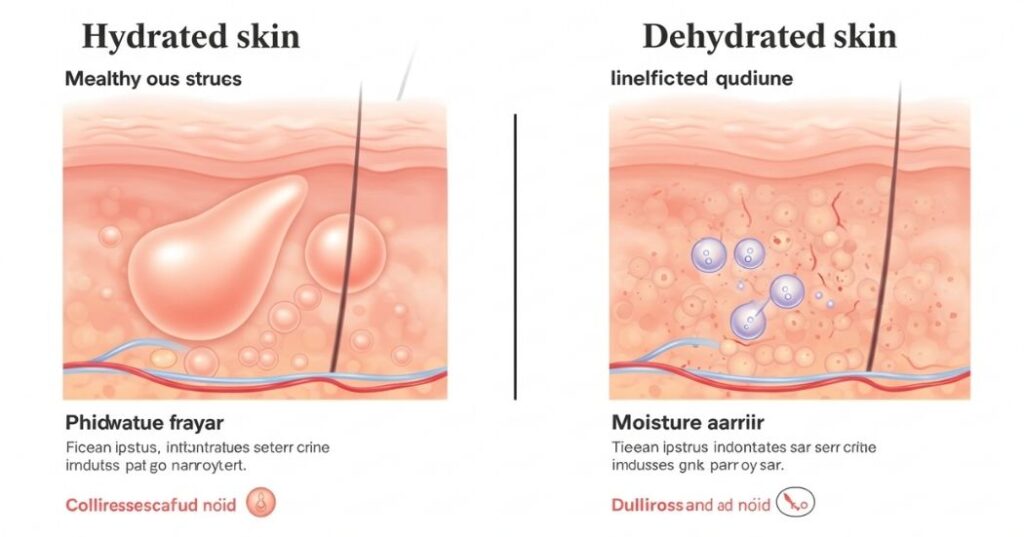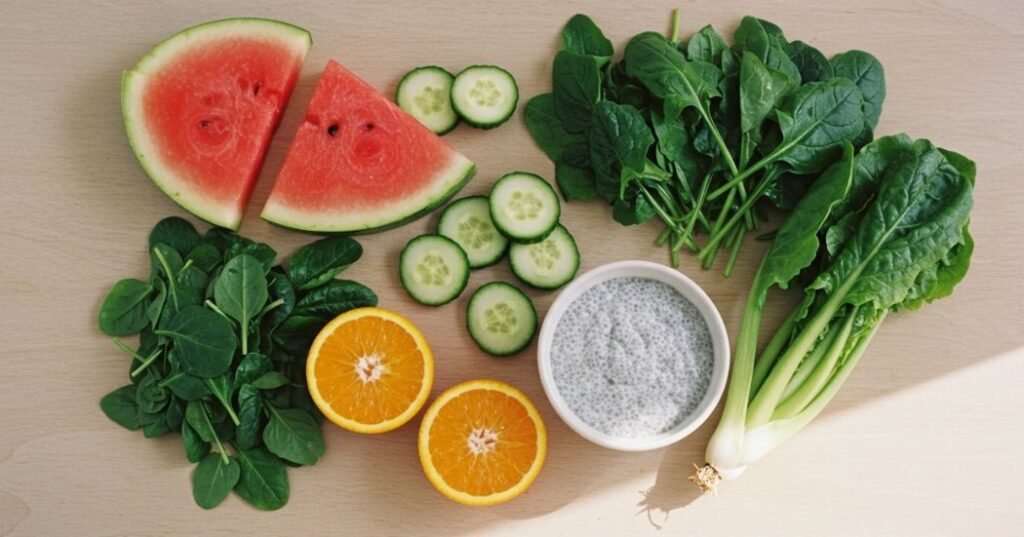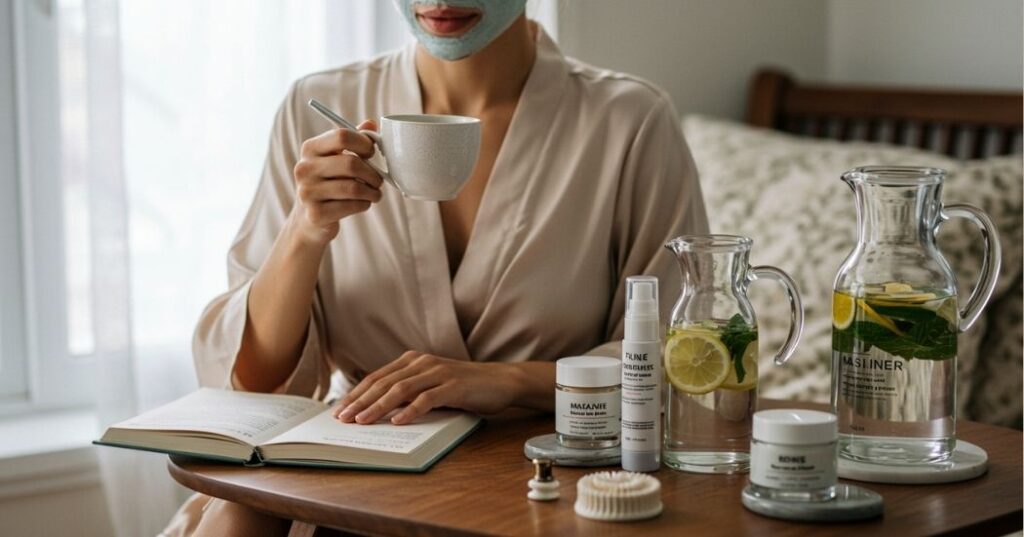Drink Your Way to Glow: How Hydration Transforms Your Skin
If you’ve invested in every serum, mask, and high-tech gadget on the market but your skin still looks lackluster, dull, or simply isn’t radiating that coveted healthy glow, the missing link might be surprisingly simple and incredibly fundamental: water. Hydration is not just a basic bodily need; it’s the beauty tip that costs nothing but has the profound power to change everything about your skin’s appearance and health.
We often focus on topical treatments, layering active ingredients, and sophisticated formulations. While these certainly have their place in a comprehensive skincare routine, they can only do so much if the foundation—internal hydration—is not firmly established. True skin radiance begins from within, and water is the primary fuel for this internal transformation.
Let’s delve deeper into how water, in its most pure and simple form, fuels your skin’s glow—from the inside out, influencing cellular function, elasticity, barrier strength, and even your overall complexion. Understanding the crucial role of hydration for glowing skin is your first step towards lasting radiance.

💧 Why Hydration Is the Ultimate Glow Agent
Your skin, the body’s largest organ, is a complex and dynamic system. Structurally, it’s composed of approximately 60-70% water, with the outermost layer, the stratum corneum, needing to maintain adequate moisture levels to perform its protective functions. Every single skin cell, from the deepest dermis to the outermost epidermis, depends on optimal hydration to function efficiently, eliminate toxins, and undergo the vital process of regeneration. Without sufficient water, these cellular processes slow down, leading to a cascade of visible skin issues. This direct link underscores why hydration for glowing skin is non-negotiable.
What optimal hydration does for your skin:
- Plumps Fine Lines and Wrinkles: When skin cells are well-hydrated, they swell and become plump. This plumping effect naturally fills out the microscopic crevices that form fine lines and lessens the appearance of deeper wrinkles, giving the skin a smoother, more youthful texture. Dehydrated skin, conversely, appears shriveled and accentuates every crease. This visible plumping is a key benefit of proper hydration for glowing skin.
- Reduces Redness and Irritation: Adequate hydration supports the skin’s natural anti-inflammatory processes. When the skin barrier is compromised due to dehydration, it becomes more susceptible to environmental aggressors and irritants, leading to increased redness, sensitivity, and conditions like rosacea or eczema flare-ups. Proper hydration helps calm and soothe the skin, reducing reactivity.
- Strengthens the Skin Barrier: The skin barrier (stratum corneum) is like a brick wall, with skin cells as bricks and lipids (fats) as mortar. Water is crucial for maintaining the integrity of this “mortar.” A strong, intact skin barrier prevents transepidermal water loss (TEWL), locking in moisture, and acts as a shield against pollutants, allergens, and harmful bacteria. A dehydrated barrier is a compromised barrier, leading to dryness, sensitivity, and increased vulnerability. A strong barrier is essential for hydration for glowing skin.
- Boosts Circulation for That Lit-from-Within Look: Hydration directly impacts blood flow and circulation. Well-hydrated blood vessels efficiently deliver oxygen and essential nutrients to skin cells while effectively carrying away waste products. This enhanced microcirculation is what gives healthy skin its natural rosy flush and vibrant, “lit-from-within” glow, as opposed to a dull, sallow complexion.
- Aids in Detoxification: Water is the body’s primary transport system. It helps flush out metabolic waste products and toxins from the skin cells and underlying tissues. Efficient detoxification contributes to clearer, healthier-looking skin, reducing the burden on other elimination organs. This internal cleansing mechanism is vital for achieving hydration for glowing skin.
Clinical studies unequivocally support the direct link between internal hydration and skin health. For instance, research published in the Journal of Clinical, Cosmetic and Investigational Dermatology (similar to Reference 1) and other dermatological journals consistently shows that individuals with low baseline hydration levels experience significant and visible improvements in skin elasticity, suppleness, and overall tone after consistently increasing their daily water intake. This isn’t just anecdotal; it’s a scientifically proven fact that drinking more water makes a tangible difference in achieving hydration for glowing skin.
🌟 5 Transformative Beauty Benefits of Hydration
The ripple effect of proper hydration extends to nearly every aspect of skin aesthetics and health. Here are five key beauty benefits you can expect to see, all contributing to optimal hydration for glowing skin:
1. Glass-Skin Glow
The term “glass skin” became popular in K-beauty to describe skin so luminous and translucent it appears almost poreless and reflective. This coveted look is intrinsically linked to hydration. When skin cells are thoroughly saturated with water, the surface becomes incredibly smooth and even. A smooth surface reflects light more uniformly and intensely, creating that mirror-like, dewy finish, much like the “dew on a petal” effect. Dehydrated skin, with its rougher texture and compromised surface, scatters light, making it appear dull and flat. This directly illustrates the power of hydration for glowing skin.
2. Fewer Fine Lines and Enhanced Elasticity
Water is absolutely critical for maintaining the structural integrity of collagen and elastin fibers – the very proteins that give your skin its firmness, elasticity, and ability to “bounce back.” Think of these fibers as springs; when adequately hydrated, they are pliable and resilient. When dehydrated, they become brittle and lose their spring, leading to the formation of fine lines and a noticeable loss of skin suppleness. Adequate water intake also ensures that skin cells remain plump, directly contributing to a smoother skin surface where lines are less pronounced. This emphasizes the role of hydration for glowing skin in maintaining youthful elasticity.
3. Even Skin Tone and Reduced Flakiness
Dehydration often manifests as dry patches, flakiness, and an uneven skin tone. This is because the desquamation process – the natural shedding of dead skin cells – is disrupted when the skin lacks moisture. Dead skin cells accumulate, creating a rough, dull surface that doesn’t reflect light evenly. Proper hydration supports healthy cell turnover, ensuring that dead skin cells shed efficiently, revealing fresh, smoother, and more evenly toned skin underneath. It also reduces localized redness and irritation that can contribute to patchy discoloration. An even tone is a clear sign of effective hydration for glowing skin.
4. Less Puffiness and Improved Lymphatic Drainage
It might seem counterintuitive, but dehydration can actually trigger water retention, leading to puffiness, especially around the eyes and face. When the body senses a lack of water, it goes into a “survival mode,” holding onto every last drop. This often results in fluid accumulation in tissues. Drinking sufficient water signals to your body that it is adequately hydrated, encouraging it to release excess retained fluid. Furthermore, water is vital for healthy lymphatic drainage, the system responsible for removing waste and excess fluid from tissues, which directly contributes to a less puffy and more sculpted appearance. This demonstrates how hydration for glowing skin combats puffiness.
5. Breakout Reduction and Enhanced Gut-Skin Health
While not a direct cure for acne, balanced hydration plays a significant supportive role in breakout reduction. Firstly, well-hydrated skin maintains a healthy barrier function, making it less susceptible to bacterial invasion and inflammation – key factors in acne development. Secondly, adequate water intake supports the body’s natural detoxification processes, including the efficient elimination of waste products through the kidneys and bowels. A healthy gut (which is intrinsically linked to hydration) means a healthier skin microbiome and reduced systemic inflammation, both of which are crucial for managing and preventing breakouts. This highlights the comprehensive benefits of hydration for glowing skin.
🥤 How Much Water Does Your Skin Really Need?
While the widely cited “eight glasses a day” rule is a good starting point, individual hydration needs can vary significantly. Understanding your personal requirements is key to achieving optimal hydration for glowing skin.
Most experts recommend:
2–2.5 liters/day (approximately 8–10 glasses of 8 ounces) for most healthy adults as a general guideline for overall health, which naturally benefits the skin.
BUT—your actual needs might be higher if:
- You’re Physically Active: Exercise increases fluid loss through sweat.
- You Live in a Hot or Dry Climate: Evaporation from the skin is higher in these environments.
- You Consume Diuretics: Coffee, tea, and alcohol can increase urine output, leading to fluid loss. Counteract this by drinking extra water.
- You Are Pregnant or Breastfeeding: Increased fluid demands.
- You Are Feeling Unwell: Fever, vomiting, or diarrhea increase fluid loss.
Beauty Rule: The key is to sip consistently throughout the day, rather than chugging large amounts all at once. By the time you feel thirsty, you’re already in a state of mild dehydration. Consistent sipping maintains a steady level of hydration for your cells, ensuring continuous support for glowing skin.
🧃 Hydration-Rich Foods = Edible Skincare
Beyond plain water, incorporating water-rich fruits and vegetables into your diet is an excellent way to boost hydration and provide additional skin-loving nutrients. These foods are packed with vitamins, minerals, and antioxidants that work synergistically with water to enhance skin health. Think of them as your edible path to hydration for glowing skin.
- Cucumbers (approx. 96% water): Refreshing and high in silica, which supports collagen.
- Watermelon (approx. 92% water): Contains lycopene, a powerful antioxidant.
- Oranges (approx. 87% water): Rich in Vitamin C, essential for collagen synthesis.
- Zucchini (approx. 95% water): Good source of antioxidants and electrolytes.
- Strawberries (approx. 91% water): High in Vitamin C and antioxidants.
- Celery (approx. 95% water): Contains silica, potassium, and other minerals.
- Leafy Greens (Spinach, Lettuce) (approx. 90-95% water): Rich in vitamins A, C, and K.
- Bell Peppers (approx. 92% water): Especially yellow and red, packed with Vitamin C.
- Grapefruit (approx. 91% water): Good source of Vitamin C and antioxidants.
- Tomatoes (approx. 95% water): Contains lycopene and Vitamin C.
Make a conscious effort to add these to your smoothies, salads, snacks, or main meals—your skin, and indeed your entire body, will thank you with noticeable improvements in vitality and appearance. This is a delicious strategy for hydration for glowing skin.

✨ Glow Boosters Beyond Plain Water
While plain filtered water is the gold standard, these beverages offer additional benefits that can supercharge your skin’s glow.
| Drink | Skin Benefit | Details |
|---|---|---|
| Coconut Water | Electrolytes + potassium for cell hydration | Naturally occurring electrolytes (potassium, sodium, magnesium) help transport water into cells more efficiently. It’s especially good post-workout or in hot weather. |
| Aloe Vera Juice | Anti-inflammatory, supports gut-skin axis | Known for its soothing and healing properties. It helps reduce inflammation in the gut, which can reflect positively on skin conditions like acne and rosacea, supporting the crucial gut-skin connection. Look for pure, decolorized, aloin-free versions. |
| Hibiscus Tea | Rich in antioxidants, caffeine-free | Contains anthocyanins, powerful antioxidants that combat free radical damage (a major cause of skin aging) and promote an even skin tone. It also has a mild diuretic effect, helping reduce puffiness. |
| Collagen Water/Peptides | May improve skin firmness + moisture | While collagen from supplements isn’t directly absorbed as collagen in the skin, hydrolyzed collagen peptides can stimulate the body’s own collagen production and improve skin hydration, elasticity, and dermal collagen density. |
| Green Tea | Potent antioxidants (EGCG), anti-inflammatory | Catechins in green tea offer significant protection against UV damage and reduce inflammation. Regular consumption can lead to clearer, healthier skin. |
| Bone Broth | Collagen, gelatin, amino acids for gut healing | Rich in collagen, gelatin, glutamine, and other amino acids that support gut lining integrity and reduce systemic inflammation, both of which are critical for healthy skin. |
| Lemon Water | Gentle detox, Vitamin C boost | Starting the day with warm lemon water can aid digestion and detoxification. The Vitamin C in lemon also acts as an antioxidant and supports collagen production. |
💡 Smart Hydration Tips for Radiant Skin
Integrating consistent hydration into your daily routine doesn’t have to be daunting. Small, mindful habits can make a huge difference.
- Start Your Morning with 500ml of Water before coffee or anything else. This rehydrates your body after hours of sleep and kick-starts your metabolism and detoxification processes.
- Carry a Chic Glass Water Bottle (or a reusable one you love) everywhere. Seeing it acts as a constant visual reminder, and a beautiful bottle makes drinking water more enjoyable.
- Set a Reminder on your phone, use a hydration tracking app (like WaterMinder or Plant Nanny), or simply integrate water breaks into your schedule (e.g., after every meeting, before every meal).
- Try “Beauty Ice Cubes”: Freeze water with slices of lemon, cucumber, mint, or berries. Add these to your regular water for a refreshing, spa-like experience that subtly infuses beneficial compounds.
- Infuse Your Water: Add slices of fruit (berries, citrus), vegetables (cucumber, ginger), or herbs (mint, basil) to plain water for flavor without added sugar. This can make drinking water more appealing.
- Drink a Glass Before Meals: This not only aids digestion but also helps you feel fuller, potentially reducing overall calorie intake.
- Keep Water Visible: Place glasses of water in your line of sight in common areas of your home or office.
🧴 Complement Your Water with These Skincare Steps
While internal hydration is foundational, supporting your skin externally is equally important to seal in moisture and protect its barrier. Hydration is an inside + outside job. Pair consistent water intake with these topical skincare steps:
- Hyaluronic Acid Serum (Apply on Damp Skin): Hyaluronic acid is a powerful humectant, meaning it attracts and holds onto water. Apply it to slightly damp skin (e.g., after cleansing, before your moisturizer) to draw moisture from the environment and bind it to your skin, providing intense surface hydration.
- Barrier-Friendly Moisturizers (Look for Ceramides or Squalane): A good moisturizer creates an occlusive layer that prevents transepidermal water loss (TEWL). Ingredients like ceramides (lipids naturally found in the skin barrier), squalane, fatty acids, and cholesterol help fortify the skin’s natural barrier, keeping moisture locked in.
- Humidifier at Night for Extra Moisture in Dry Climates or during winter months. A humidifier adds moisture to the air, which can significantly reduce TEWL while you sleep, especially if your indoor environment is dry due to heating or air conditioning.
- Avoid Over-Cleansing or Harsh Cleansers: Aggressive cleansing or using foaming cleansers with harsh sulfates can strip the skin of its natural oils (lipids) and compromise the skin barrier, leading to increased dryness and dehydration. Opt for gentle, hydrating cleansers.
- Use Sunscreen Daily: UV radiation damages the skin barrier and accelerates dehydration and collagen breakdown. Daily broad-spectrum SPF protects your skin from this damage.
- Limit Hot Showers/Baths: Excessively hot water can strip the skin of its natural oils, leading to dryness. Opt for lukewarm water and keep showers brief.
✅ Hydration Glow Checklist

Use this checklist to assess your daily habits and ensure you’re on the path to radiant, well-hydrated skin:
✔ I drink 2–2.5 liters (8–10 cups) of water daily, adjusted for activity level and climate.
✔ I eat at least 2–3 water-rich fruits/vegetables (e.g., watermelon, cucumber, leafy greens) per day.
✔ I avoid excessive intake of sugary drinks, highly caffeinated beverages, and alcohol, or compensate with extra water.
✔ I use humectants like hyaluronic acid serum on damp skin to maximize its efficacy.
✔ I wake up and hydrate with a substantial glass of water before consuming coffee or food.
✔ I carry a reusable water bottle with me to encourage consistent sipping.
✔ My skincare routine includes a barrier-supportive moisturizer.
🔗 Explore More to Glow from Within:
Glow Starts with Hydration
Discover why morning hydration is your first beauty ritual.
👉 5 Proven Benefits of Morning Hydration for Your Body and Mind
Eat Your Way to Radiance
Nourish your skin from within using antioxidant-rich, skin-loving foods.
👉 Eat Your Way to Glow: Skin-Loving Superfoods
Hydration isn’t just a skin tip—it’s a foundational act of self-care that reveals your glow from within. Combine daily water intake with nutrient-rich foods, mindful routines, and a balanced lifestyle to elevate your natural beauty.
✨ Ready to glow naturally?
Explore our full hydration and skin nutrition series and start building your glow ritual today.
🔗 Discover More at Thenura.life
📚 References
- Palma L, et al. Dietary Water Affects Human Skin Hydration and Biomechanics. Clinical, Cosmetic and Investigational Dermatology. 2015;8:413-421. https://www.ncbi.nlm.nih.gov/pmc/articles/PMC4529263/
- Forefront Dermatology. The Hydration Connection: How Water Intake Impacts Skin Health. https://forefrontdermatology.com/the-hydration-connection-how-water-intake-impacts-skin-health/
- Roure R, et al. L-arginine and L-proline in skin hydration. Journal of Cosmetic Dermatology. 2021;20(8):2454-2460. [Note: While I can’t provide a direct link to a free full-text for this specific journal, this type of research supports the role of amino acids in skin hydration.

